Shady and covered the way through the lofty middlemost alley,
Which upon steps that were made of unhewn blocks you ascended.
There were the Muscatel, and there were the Chasselas hanging
Side by side, of unusual size and colored with purple,
All set out with the purpose of decking the visitor’s table;
While with single vine-stocks the rest of the hillside was covered,
Bearing inferior clusters, from which the delicate wine comes.
Thus up the slope she went, enjoying already the vintage,
And that festive day on which the whole country, rejoicing,
Picks and tramples the grapes, and gathers the must into vessels:
Fireworks, when it is evening, from every direction and corner
Crackle and blaze, and so the fairest of harvests is honored.
But more uneasy she went, her son after twice or thrice calling,
And no answer receiving, except from the talkative echo,
That with many repeats rang back from the towers of the city.
Strange it was for her to seek him; he never had gone
to a distance
That he told her not first, to spare his affectionate
mother
Every anxious thought, and fear that aught ill had
befallen.
Still did she constantly hope that, if further she
went, she should find him;
For the two doors of the vineyard, the lower as well
as the upper,
Both were alike standing open. So now she entered
the cornfield,
That with its broad expanse the ridge of the hill
covered over.
Still was the ground that she walked on her own; and
the crops she rejoiced in,—
All of them still were hers, and hers was the proud-waving
grain, too,
Over the whole broad field in golden strength that
was stirring.
Keeping the ridgeway, the footpath, between the fields
she went onward,
Having the lofty pear-tree in view, which stood on
the summit,
And was the boundary-mark of the fields that belonged
to her dwelling.
Who might have planted it, none could know, but visible
was it
Far and wide through the country; the fruit of the
pear-tree was famous.
’Neath it the reapers were wont to enjoy their
meal at the noon-day,
And the shepherds were used to tend their flocks in
its shadow.
Benches of unhewn stones and of turf they found set
about it.
And she had not been mistaken, for there sat her Hermann,
and rested,—
Sat with his head on his hand, and seemed to be viewing
the landscape
That to the mountains lay: his back was turned
to his mother.
Towards him softly she crept, and lightly touched
on the shoulder;
Quick he turned himself round: there were tears
in his eyes as he met her.
“Mother, how hast thou surprised me!”
he said in confusion; and quickly
Wiped the high-spirited youth his tears away.
But the mother,
“What! do I find thee weeping, my son?”
exclaimed in amazement.
“Nay, that is not like thyself: I never
before have so seen thee!
Tell me, what burdens thy heart? what drives thee
here, to be sitting
Under the pear-tree alone? These tears in thine
eyes, what has brought them?”




